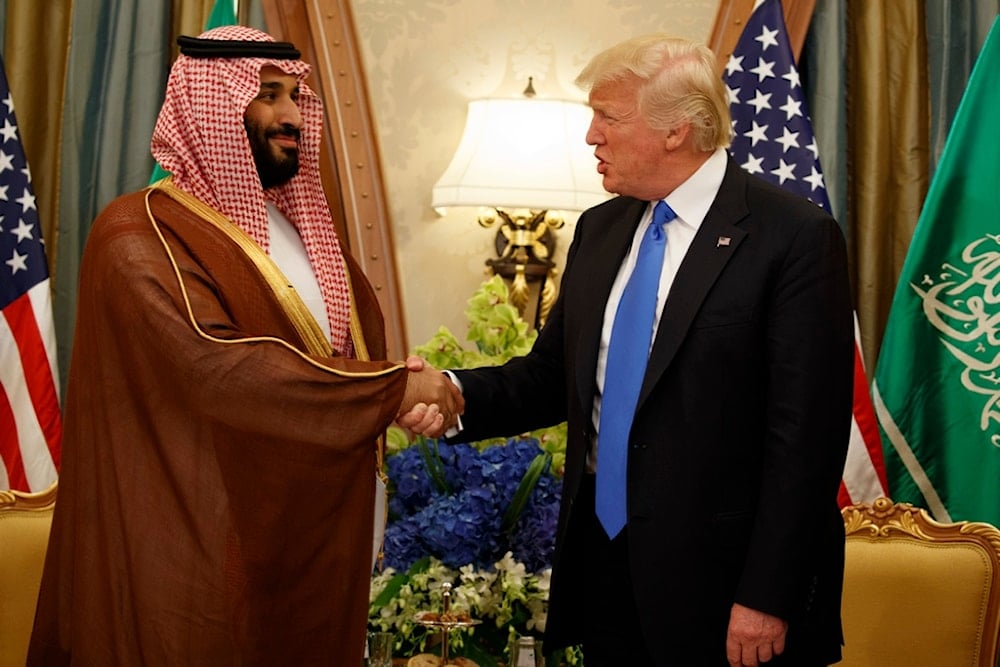US drops 'Israel' normalization demand in Saudi nuclear talks: Reuters
Sources said Washington no longer requires Saudi Arabia to normalize ties with "Israel" as a condition for civil nuclear cooperation.
-

US President Donald Trump shakes hands with Saudi Deputy Crown Prince and Defense Minister Mohammed bin Salman during a bilateral meeting, in Riyadh, May 20, 2017 (AP, File)
The US is no longer demanding that Saudi Arabia normalize ties with "Israel" as a precondition for advancing civil nuclear cooperation talks, two sources with knowledge of the matter told Reuters, ahead of US President Donald Trump's upcoming visit to the kingdom.
This marks a significant policy shift by Washington. Under former President Joe Biden, nuclear negotiations with Riyadh were tied to a broader US-Saudi agreement that included recognizing "Israel" and a potential defense treaty with the United States.
Normalization with 'Israel' no longer a prerequisite
Saudi Arabia has consistently stated it will not recognize "Israel" without the establishment of a Palestinian state. This stance had stalled efforts by the Biden administration to expand the so-called "Abraham Accords", under which the United Arab Emirates, Bahrain, and Morocco established ties with "Israel" during Trump’s first term.
Efforts to push Riyadh toward normalization have lost momentum amid widespread outrage across the Arab world over the ongoing Israeli war on Gaza. Simultaneously, US non-proliferation concerns have hindered the progress of nuclear talks.
Section 123 Agreement remains major hurdle
While US Energy Secretary Chris Wright said during an April visit that the two countries were on a “pathway” to a civil nuclear agreement, one of the sources cautioned that a finalized deal is not yet within reach.
According to Reuters, one key obstacle remains Saudi Arabia’s reluctance to sign a so-called "Section 123" agreement under the US Atomic Energy Act. Such an agreement would prohibit Riyadh's uranium enrichment and plutonium reprocessing, two pathways that could potentially lead to the development of nuclear weapons.
Saudi Energy Minister Prince Abdulaziz bin Salman has insisted that the kingdom seeks to enrich uranium and export nuclear fuel.
According to one of the sources, Riyadh still refuses to commit to the 123 conditions, which Washington views as a prerequisite for any nuclear deal.
Saudi enrichment facilities operated by US personnel
To reconcile the differences, one proposed solution involves a "black box" model, in which uranium enrichment facilities would be located on Saudi soil but operated exclusively by US personnel, the same source revealed.
Wright noted there are several ways to structure a deal that meets the goals of both sides. Nonetheless, the fundamental disagreement over enrichment rights continues to delay a conclusive agreement.
Riyadh's pursuit of nuclear capabilities is part of its broader strategy to diversify its energy sources and reduce dependency on oil. By freeing more crude for export, nuclear energy would also serve the kingdom’s economic ambitions.
However, arms control advocates have raised concerns over Crown Prince Mohammed bin Salman’s past remarks suggesting Saudi Arabia would seek nuclear weapons if Iran were to do so.
The development comes as the US and Iran continue indirect talks over Tehran’s nuclear program.
US Vice President JD Vance recently stated that discussions were progressing and hinted at a potential deal that could reintegrate Iran into the global economy while preventing it from developing a nuclear weapon.
Read more: US must not offshore its AI to Gulf states: FP
Trump's Saudi visit to focus on arms, investment
Trump is scheduled to visit Saudi Arabia next week to discuss a series of major economic and strategic agreements. According to Reuters, Washington is preparing to offer Riyadh an arms package worth over $100 billion.
The US is also encouraging the kingdom to increase its planned investment in the American economy from $600 billion to $1 trillion.
Trump’s visit to Saudi Arabia will be his second foreign trip since returning to office in January, following a brief visit to Rome for the pope’s funeral.
During his first term, Trump cultivated close ties with Gulf states, and Saudi Arabia was his first international stop as president. Following his departure from office, the kingdom invested $2 billion in a firm founded by his son-in-law Jared Kushner. Plans are also underway to construct two Trump towers in Jeddah and Riyadh.
Read more: Gaza ceasefire, chips, and naming rights: Trump signals Mideast moves

 4 Min Read
4 Min Read









